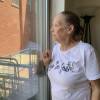Updated at 11:44 a.m. Tuesday, Nov. 2.
Hundreds of people rushed to take down tents and shove their belongings into plastic bins Monday morning, as the city reached its deadline to clear out the area known as Mass and Cass, a concentration of homelessness and substance use resources along Massachusetts Avenue and Melnea Cass Boulevard in Boston.
From his perch on a broken desk chair outside his own tent, José, who asked GBH News not to use his last name, smoked a cigarette and watched the bins being loaded into big white vans.
“I don’t want to stay here,” José told GBH News. “But now I have no place to go.”
Despite efforts to clear the encampment in recent weeks, more than 150 tents remained. In response, the city took a more direct approach, with eviction notices placed on tents and tarps setting a deadline to clear out by 8 a.m. Monday.
“Due to health, environmental and sanitary concerns … the City of Boston will conduct a cleanup in this area,” one eviction notice reads. “The city will dispose of all property remaining at the cleanup time.”

In accordance with Acting Mayor Kim Janey’s executive order, issued last month, people living in tents were offered rooms at two separate overnight shelters for men and women in the neighborhood, information about substance use recovery services and free storage of their possessions in a 27-gallon container for a maximum of 90 days.
José, who was incarcerated for 10 years and lived on Mass and Cass for five, says he doesn’t want to live in a shelter or any institutionalized facility.
“I don’t want to go back to jail, and shelters are jail,” José said. “People working there don’t know how to treat addicts, and people here don’t treat us like human beings. Treat me like an animal, I’ll do what an animal does.”
José gestured to a hamper full of laundry and a box full of dirty dishes and tupperware. He says he takes his clothes to a laundromat a mile away and washes his dishes in a 5-gallon jug, which he also uses to bathe.
More Local News
“If I had an apartment, a place to live, that would be the first, and the biggest, step in my recovery,” he said. “I can’t recover like this.”
As city workers and outreach teams from the Boston Public Health Commission loaded up the bins, people being evicted were asked if they wanted to be taken to shelter or a detox facility. Some took up the offer, while others didn’t.
“Are you sure you don’t want to come with me?” a BPHC worker asked a woman after packing up her things. The woman shook her head no, picked up two backpacks and made her way down the street. According to the city, some 170 beds are currently available at nearby shelters.

Per Janey’s executive order, “individuals who refuse to move tents on public property may be considered disorderly and subject to enforcement of existing laws.” Janey has previously stated that “enforcement may be used as a last resort” and that people are free to leave and not inherently subject to arrest for noncompliance.
The city says outreach workers will continue to engage unsheltered individuals and attempt to connect them with services, “because every unsheltered person is at risk and in need of assistance.”
Mercedes, who asked GBH News not to use her last name, ran back and forth from the van to her friend’s tent, packing things into boxes in a frantic rush.
“If this was really helping, people wouldn’t be rushing out like this," Mercedes told GBH News. “People don’t want to be forced out of here and into a shelter.”
Maneta Johnson, who lived on Mass and Cass for three years before securing housing in the South End, said he rode his bicycle to check on the people he knew in the encampment.
“If someone is overdosing, someone here will understand how to help them,” Johnson said. “We take care of one another, it’s a community here. We’re all each other has.”
After the scheduled removal of tents was well underway, police made arrests in the area and brought the defendants into a makeshift courthouse inside the nearby South Bay House of Corrections. These trials are part of what Janey is calling a “Community Resource Session” targeting individuals charged with “serious offenses” who are “preying upon the more vulnerable in this part of our city,” according to a Globe interview with Stephanie Garrett-Stearns, the city’s chief communications officer.
Three defendants were held in individual cells at the Suffolk County Jail after being detained Monday morning. Out of three defendants — all of whom were described in court proceedings as experiencing substance use disorder — one, Patrick Michael Kennefick of West Roxbury, 37, was allowed treatment in a medical facility in Quincy. The two others, Phillip Curtis Houston, 41, from Boston, and Maxwell Kolodka of Gardner, 33, were denied access to a formal detox facility and were ordered to spend the night in a jail cell."

At the time of his trial, Kolodka had been held in a jail cell without medical treatment for six hours. Josh Raisler Cohn, a public defender representing Kolodka, asked Judge Paul Treseler if his client could be admitted to a treatment facility instead of spending the night in a jail cell before being taken to Fitchburg District Court.
“The kind of care that he needs is available to him, our understanding is that the purpose of this session partly is to clear warrants and partly is to get people into care,” Cohn told the judge. “We’ve been working hard all day at getting him that care, and I would ask that he be allowed to go to that care.”
Suffolk County Assistant District Attorney Mariah O’Rourke, representing the Commonwealth, reiterated that seeking care was also the state’s understanding of the purpose of these proceedings.
“Okay,” Treseler responded, denying both requests. “He’s going to Fitchburg.”
In an observation room just outside, advocates from the Massachusetts Bail Fund watched closely and took notes with increasing frustration.
“There’s this false distinction that there are people harming the communities, and those are the people with serious offenses that will be brought in, when the data show that most of the folks that are brought in have low-level offenses and/or drug offenses,” Mass Bail Fund director Janhavi Madabushi told GBH News. “This is a bifurcation that justifies policing our people and incarcerating our people. ... It creates this false boogeyman.”
The special court will continue through Wednesday, with three more defendants scheduled for hearings on Tuesday. The unusual proceedings — held inside of a jail, beginning hours after schedule and frequently stopping for prolonged recesses — were criticized by public defenders and advocates who had been standing by since the session began.
“During the course of a full day, three people were taken off the street and pulled into this makeshift courthouse. Nothing happened here that couldn’t have happened at any of the nearby courthouses,” Chief Counsel Anthony Benedetti from the Massachusetts Committee for Public Counsel Services said in a statement to GBH News Monday. “In fact, it is likely that these people would have had access to treatment faster. Thousands of dollars have been spent to keep [the] jail court open, and it wasn’t even fully open.”

As the sun set on Mass and Cass, a few of the encampment’s residents were lingering on side streets, while garbage trucks stuffed with tents and sleeping bags sat open and idling on Melnea Cass Boulevard.
“The City commends the dedication, compassion and professionalism of the City of Boston employees who helped connect 17 people with pathways to transitional housing today,” a city spokesperson said in a statement to GBH News Monday. “Of those, 9 have already toured new apartments. These efforts also resulted in the storage or removal of 16 tents in the area.”
Several other individuals enrolled in treatment, moved to shelter or returned to their own permanent homes, according to the city.
“While the progress on the first day was extraordinary, in the weeks ahead, the City remains committed to engaging with every individual who is suffering from unsheltered homelessness or substance use disorder across our city, including those who did not engage in services today,” the statement reads.
Though eviction notices gave a specific time for tents to be cleared out or disposed of by the city, a city spokesperson says that “the availability of appropriate shelter, housing and/or treatment bed options for each unsheltered person is what will determine the pace of the City’s current encampment operations. No unsheltered individual will be required to remove their tent, before shelter, housing, or treatment is available for them.”
Correction: An earlier version of this story misstated Mariah O'Rourke's title, the name of a Fitchburg courthouse, and which defendant received medical treatment in a detox facility.








